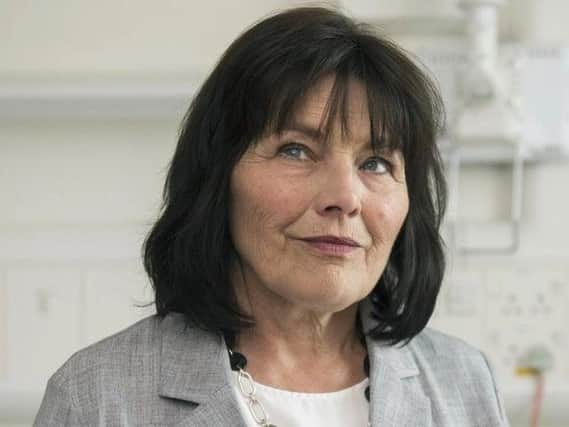Smaller care homes faring ‘better’ during Covid-19 pandemic


Jeane Freeman said that “early emerging information” during the outbreak indicated that homes with 30 beds or fewer had seen lower rates of infection.
She also did not rule out the nation’s care watchdog being given extra powers, and said it had been asked by the government to scrutinise any connection between previous care assessments which may have identified concerns or failings, and how homes have coped during the pandemic.
Advertisement
Hide AdAdvertisement
Hide AdAddressing a virtual meeting of Holyrood’s health committee, Ms Freeman stressed that it remained difficult to ascertain why some care homes have remained free from the spread of the virus, while others have endured deadly outbreaks.
But she told MSPs: “What appears to be emerging from some of the evidence, but is by no means complete at this point, is that there does appear to be a distinction between the sizes of care homes, with care homes of a smaller size - 30 beds or under - appearing to do better in terms of handling this virus and the instances of it compared to others.
The session, dominated by questions about the care sector, came a day after it emerged that more people have now died with the virus in the country's care homes than in its hospitals.
There have been a total of 1,818 deaths linked to the virus in care homes, compared to 1,815 Covid-19 deaths recorded in hospitals.
While the number of care home deaths has been declining, down from 124 a fortnight ago to 68 last week, the Scottish Government remains under growing pressure over how it has responded to the crisis.
Only this morning, the Scottish Conservative leader Jackson Carlaw called on the government to appoint a dedicated minister for care homes, arguing that the situation had become so severe that it required the undivided attention of a senior government figure.
In her opening statement to the committee, Ms Freedman said that the most recent data showed that 38 per cent of adult care homes have lodged no notification of suspected Covid-19 cases to the Care Inspectorate, with 58 per cent of homes not registering a case in the last 14 days.
She said: “We have followed the best advice and taken the judgements that we believed to be correct from the outset of this pandemic.
Advertisement
Hide AdAdvertisement
Hide Ad“There are undoubtedly lessons to be learned and more work for us to do.”
Scottish Labour’s David Stewart pressed Mr Freeman on whether there were plans to “beef up” the resources and powers of the Care Inspectorate to identify residents at risk, and take action against care homes which fail to make improvements. “Who is guarding the guards,” he asked?
Ms Freeman said the inspectorate has a number of “Important powers,” and pointed to the “very serious” step it had taken in seeking a court order to cancel the registration of Home Farm care home on Skye, where 10 residents have died since the start of the outbreak.
She said she spoke with the Care Inspectorate last week, and was provided with details of 27 on-site inspections that have been carried out across 19 establishments in the last two to three weeks. If any failings were identified, Ms Freeman said, the inspectorate would be able to take action
But she added: “That does not rule out the inspectorate having more powers than they currently have. I’m very happy to look at that in the round as we look at what lessons we are learning.”
Ms Freeman later said that the Care Inspectorate had been asked by the government “to look at whether there is any connection between the assessments from previous care inspections and how homes have coped with the current situation.” The outcomes of that work, she said, remained inconclusive.
Prior to the meeting, the committee issued a call for evidence from care home owners and managers, as well as residents and their relatives. Its convenor, Lewis Macdonald MSP, said there had been many responses. However, none of the information has been made public.
“A number of respondents asked us to keep their submissions confidential, and in order to get as much evidence as possible, we have chosen not to make submissions public.
Advertisement
Hide AdAdvertisement
Hide Ad“We want all concerned to feel that they can tell us what they know without fear of adverse consequences.
“While our usual approach to written evidence is to make it public, we recognise that in the current circumstances, we need to offer those on the frontline some additional protection so that we can hear from as many people as possible.”
A message from the Editor:Thank you for reading this story on our website. While I have your attention, I also have an important request to make of you.With the coronavirus lockdown having a major impact on many of our advertisers - and consequently the revenue we receive - we are more reliant than ever on you taking out a digital subscription.Subscribe to scotsman.com and enjoy unlimited access to Scottish news and information online and on our app. With a digital subscription, you can read more than 5 articles, see fewer ads, enjoy faster load times, and get access to exclusive newsletters and content. Visit https://www.scotsman.com/subscriptions now to sign up.
Our journalism costs money and we rely on advertising, print and digital revenues to help to support them. By supporting us, we are able to support you in providing trusted, fact-checked content for this website.
Joy Yates
Editorial Director
Comments
Want to join the conversation? Please or to comment on this article.